Constitution of Italy
| Constitution of the Italian Republic | |
|---|---|
Council of State | |
| Federalism | No, but constituent entities enjoy self-government |
| Electoral college | Yes: consists of Parliament and three delegates of Regional Councils[b] |
| Entrenchments | 1 |
| History | |
| Amendments | 16 |
| Last amended | 2022 |
| Full text | |
| Part of the Politics series |
 |
|---|
|
|
The Constitution of the Italian Republic (Italian: Costituzione della Repubblica Italiana) was ratified on 22 December 1947 by the Constituent Assembly, with 453 votes in favour and 62 against, before coming into force on 1 January 1948, one century after the previous Constitution of the Kingdom of Italy had been enacted.[1] The text, which has since been amended sixteen times,[2] was promulgated in an extraordinary edition of Gazzetta Ufficiale on 27 December 1947.[3]
The
Constituent Assembly
Piero Calamandrei, a professor of law, an authority on civil procedure, spoke in 1955 about World War II and the formation of the Italian constitution:
If you want to go on a pilgrimage to the place where our constitution was created, go to the mountains where partisans fell, to the prisons where they were incarcerated and to the fields where they were hanged. Wherever an Italian died to redeem freedom and dignity, go there, young people, and ponder: because that was where our constitution was born.[6]
The groups that composed the Constituent Assembly covered a wide range of the
All the different political and social views of the Assembly contributed in shaping and influencing the final text of the Constitution. For example, constitutional protections concerning
There were 556 members of the Constituent Assembly, of which 21 were women, with 9 from the
Provisions
The Constitution[12] is composed of 139 articles (five of which were later abrogated) and arranged into three main parts: Principi Fondamentali, the Fundamental Principles (articles 1–12); Part I concerning the Diritti e Doveri dei Cittadini, or Rights and Duties of Citizens (articles 13–54); and Part II the Ordinamento della Repubblica, or Organisation of the Republic (articles 55–139); followed by 18 Disposizioni transitorie e finali, the Transitory and Final Provisions.
It is important to note that the Constitution primarily contains general principles; it is not possible to apply them directly. As with many written constitutions, only few articles are considered to be self-executing. The majority require enabling legislation, referred to as accomplishment of constitution.[13] This process has taken decades and some contend that, due to various political considerations, it is still not complete.
Preamble

The preamble to the Constitution consists of the enacting formula:
The provisional Head of State, by virtue of the deliberations of the Constituent Assembly, which in the session of 22 December 1947 approved the Constitution of the Italian Republic; by virtue of Final Provision XVIII of the Constitution; promulgates the Constitution of the Italian Republic in the following text:
Fundamental Principles (Articles 1–12)
The Fundamental Principles declare the foundations on which the Republic is established, starting with its democratic nature, in which the sovereignty belongs to the people and is exercised by the people in the forms and within the limits of the Constitution. The Principles[12] recognise the dignity of the person, both as an individual and in social groups, expressing the notions of solidarity and equality without distinction of sex, race, language, religion, political opinion, personal and social conditions. For this purpose, the right to work is also recognized, with labour considered the foundation of the Republic and a mean to achieve individual and social development: every citizen has a duty to contribute to the development of the society, as much as they can, and the Government must ensure the freedom and equality of every citizen.
While the Principles recognise the
The State and the Catholic Church are recognised as independent and sovereign, each within its own sphere. Freedom of religion is also recognised, with all religions having the right of self-organisation, as long as they don't conflict with the law, and the possibility to establish a relation with the State through agreements. In particular, Article 7 recognises the Lateran Treaty of 1929, which gave a special status to the Catholic Church, and allows modification to such treaty without the need of constitutional amendments. In fact, the treaty was later modified by a new agreement between church and state in 1984.[14]
The Principles mention the
The last of the Principles establishes the Italian tricolour as the flag of Italy: green, white and red, in three vertical bands of equal dimensions.
Rights and Duties of Citizens (Articles 13–54)
Civil Relations (Articles 13–28)
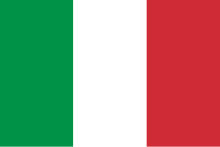
Articles 13–28 are the Italian equivalent of a bill of rights in common law jurisdictions. The Constitution[12] recognises habeas corpus and the presumption of innocence; violations of personal liberties, properties and privacy are forbidden without an order of the Judiciary stating a reason, and outside the limits imposed by the law.
Every citizen is
Every citizen is protected from
Ethical and Social Relations (Articles 29–34)

The Constitution
Economic Relations (Articles 35–47)
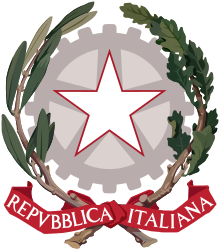
According to the Constitution,
The Constitution recognises
Political Relations (Articles 48–54)
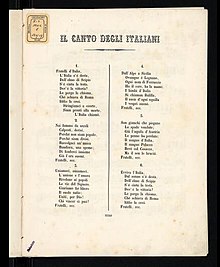
Article 48
Article 52 states that the defence of the homeland is mandatory and the "sacred duty for every citizen". It also stipulates that national service is performed within the limits and in the manner set by law. Since 2003, Italy has no more conscription, even though it can be reinstated if required. The fulfilment of which cannot prejudice a citizen's employment, nor the exercise of political rights. Particular mention is given to the democratic spirit of the Republic as the basis for the regulation of the armed forces.
The Constitution establishes a progressive form of taxation, which requires every citizen to contribute to public expenditure in accordance with their capability. Also, Article 54 states that every citizen has the duty to be loyal to the Republic and to uphold its Constitution and laws. Elected officials have the duty to fulfil their functions with discipline and honour, taking an oath to that effect in those cases established by law.
Organisation of the Republic (Articles 55–139)
Power is divided among the executive, the legislative and judicial branches; the Constitution establishes the balancing and interaction of these branches, rather than their rigid separation.[21]
Parliament (Articles 55–82)
The Houses (Articles 55–69)

Article 55
The Chamber of deputies is elected by
The Senate of the Republic is elected by
Disqualifications for the office of deputy or senator are determined by law
In default of any other provisions, Parliament has to be convened on the first working day of February and October.
Members of Parliament do not have a binding mandate, cannot be held accountable for the opinions expressed or votes cast while performing their functions, and cannot be submitted to personal or home search, arrested, detained or otherwise deprived of personal freedoms without the authorisation of their House, except when a final court sentence is enforced, or when the member is apprehended in flagrante delicto.
The salary of the members of Parliament is established by law.
Legislative Process (Articles 70–82)
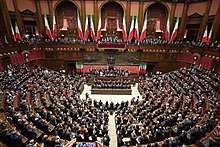
Article 70
After the approval by the Parliament, laws are promulgated by the President of the Republic within one month or a deadline established by an absolute majority of the Parliament for laws declared urgent. A law is published immediately after promulgation and comes into force on the fifteenth day after publication, unless otherwise established. The President can veto a bill and send it back to Parliament stating a reasoned opinion. If such law is passed again, the veto is overruled and the President must sign it.
The Constitution recognises general
The
The Constitution gives to the Parliament the authority to
through a law having a two-thirds majority in both Houses, on each section and on the final vote, and having a deadline for implementation. Such amnesties and pardons cannot be granted for crimes committed after the introduction of such bill.Parliament can authorise by law the ratification of such
Budget and financial statements introduced by the
Both Houses can conduct enquiries on matters of public interest, through a Committee of its Members representing the proportionality of existing
The President of the Republic (Articles 83–91)


The
Any citizen over fifty enjoying civil and political rights can be elected president. Those citizens who already hold any other office are barred from becoming president, unless they resign their previous office once they are elected. The salary and privileges of the president are established by law.
In all the cases in which the president is unable to perform the functions of the Office, these shall be performed by the President of the Senate of the Republic. In the event of permanent incapacity, death or resignation of the President of the Republic, the President of the Chamber of Deputies must call an election of a new President of the Republic within fifteen days, notwithstanding the longer term envisaged during dissolution of the Parliament or in the three months preceding dissolution.
According to the Constitution, the primary role of the president, as head of the state, is to represent the national unity. Among the powers of the president are the capacity to
- send messages to Government, and promulgate laws, decrees and regulations,
- dissolve one or both Houses of Parliament, in consultation with their presidents, except during the last six months of his term (known as the semestre bianco), unless that period coincides at least in part with the final six months of the Parliament,
- call a general referendum under certain circumstances established by the Constitution,
- appoint State officials in the cases established by law,
- accredit and receive diplomats, and ratify international treaties, after the Parliament's authorisation when required,
- make declarations of war agreed upon by the Parliament, as commander-in-chief of the armed forces,
- grant honorary distinctions of the Republic.
The President also presides over the High Council of the Judiciary and the Supreme Council of Defence. A
The President is
Before taking office, the President must take an oath of allegiance to the Republic and pledge to uphold the Constitution before the Parliament in joint session.
The Government (Articles 92–100)
The Council of Ministers (Articles 92–96)
The Government of the Republic
The primary function of the President of the council is to conduct the general policy of the Government, holding responsibility for it. The President of the Council ensures the coherence of political and administrative policies, by promoting and co-ordinating the activities of the Ministers. The Ministers are collectively responsible for the acts of the
The organisation of the Presidency of the council, as well as the number, competence and organisation of the ministries is established by law. The
Public Administration (Articles 97–98)
General government entities must ensure a
Auxiliary Bodies (Articles 99–100)
The
The
The Judicial Branch (Articles 101–113)
The Organisation of the Judiciary (Articles 101–110)
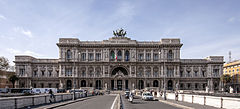
Article 101
The
The High Council of the Judiciary is presided over by the
The council has jurisdiction for employment, assignments and transfers, promotions and disciplinary measures of judges, following the regulations established by the Judiciary.
Judges cannot be removed, dismissed or suspended from office or assigned to other courts or functions unless by a decision of the council, following the rules established by the Judiciary or with the consent of the judges themselves. Judges are distinguished only by their different functions, and the state prosecutor enjoys the guarantees established by the Judiciary.
The legal authorities have direct use of the judicial police. The
Rules on Jurisdiction (Articles 111–113)
The formation of evidence is based on the principle of adversary hearings and the laws regulates the cases in which the formation of evidence does not occur in an adversary proceeding with the consent of the defendant or owing to reasons of ascertained objective impossibility or proven illicit conduct. Presumption of innocence is recognised and the guilt of the defendant cannot be established on the basis of statements by persons who by choice have always avoided cross-examination by the defendant or the defence counsel.
All judicial decisions must include a statement of reasons, and
The public prosecutor has the obligation to institute criminal proceedings. The judicial safeguarding of rights and legitimate interests before the bodies of ordinary or administrative justice is always permitted against acts of the public administration. Such judicial protection cannot be excluded or limited to particular kinds of appeal or for particular categories of acts. The law determines which judicial bodies are empowered to annul acts of public administration in the cases and with the consequences provided for by the law itself.
Regions, Provinces, Municipalities (Articles 114–133)
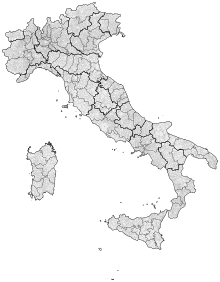
- Regions (black borders)
- Provinces (dark gray borders)
- Comuni (light grey borders)
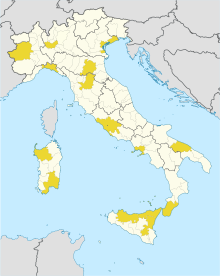
According to Article 114
The Constitution grants the
The Constitution gives the State exclusive legislative power in matters of
- register offices;
- relations between the Republic and religious denominations;
- armaments, ammunition and explosives;
- the public accounts;[24]
- state bodies and relevant Municipalities, Provinces and Metropolitan Cities;
- legal and administrative organisation of the State and of national public agencies, police;
- jurisdiction and procedural law; civil and criminal law; administrative judicial system;
- determination of the basic level of benefits relating to prophylaxis;
- cultural heritage.
Concurring legislation applies to the following subject matters: international and EU relations of the
The
Regulatory powers is vested in the State with respect to the subject matters of exclusive legislation, subject to any delegations of such powers to the Regions. Regulatory powers are vested in the Regions in all other subject matters.
The administrative functions that are not attributed to the
The Constitution grants Municipalities, Provinces, Metropolitan Cities and Regions to have revenue and expenditure autonomy, although subjected to the obligation of a
The Constitution grants Municipalities, Provinces, Metropolitan Cities and Regions to have their own properties, allocated to them pursuant to general principles laid down in State legislation.
The Constitution establishes the bodies of each Region as the Regional Council, the Regional Executive and its president. The Regional Council exercises the
The Statute of each Region, in compliance with the Constitution, lays down the form of government and basic principles for the organisation of the Region and the conduct of its business. The statute also regulate the right to initiate legislation and promote referendums on the laws and administrative measures of the Region as well as the publication of laws and of regional regulations. Regional Council can adopt or amend with a law approved by an absolute majority of its members, with two subsequent deliberations at an interval of not less than two months, and not requiring the approval of the Government commissioner. The
The Constitutions allows administrative tribunals of the first instance in the Region, in accordance with the law, with sections which can be established in places other than the regional capital.
The President of the Republic, as protector of the Constitution, can dissolve Regional Councils and remove the President of the Executive with a reasoned decree, in the case of acts in contrast with the Constitution or grave violations of the law, or also for reasons of national security. Such decree is adopted after consultation with a committee of Deputies and Senators for regional affairs which is set up in the manner established by the law. The President of the Executive can also be removed through a motion of no confidence by the Regional Council, that is undersigned by at least one-fifth of its members and adopted by roll call vote with an absolute majority of members. The motion cannot be debated before three days have elapsed since its introduction. The adoption of a no confidence motion against a President of the Executive elected by universal and direct suffrage, and the removal, permanent inability, death or voluntary resignation of the President of the Executive entail the resignation of the Executive and the dissolution of the council. The same effects are produced by the simultaneous resignation of the majority of the Council members.
The
Articles 115, 124, 128, 129, 130 have been repealed, and therefore have not been discussed.
Article 131 establishes the following
Constitutional Guarantees (Articles 134–139)
The Constitutional Court (Articles 134–137)
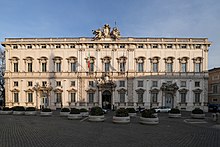
Article 134[12] states that the Constitutional Court shall pass judgement on
- controversies on the constitutional legitimacy of laws and enactments having force of law issued by the State and Regions;
- conflicts arising from allocation of powers of the State and those powers allocated to State and Regions, and between Regions;
- charges brought against the President of the Republic, according to the provisions of the Constitution.
The Constitutional Court is composed of fifteen judges, a third nominated by the
When a law is declared
Amendments to the Constitution. Constitutional Laws (Articles 138–139)
Laws amending the Constitution
Article 139 states that the form of Republic shall not be a matter for constitutional amendment, thus effectively barring any attempt to restore the monarchy.
Transitory and Final Provisions (Provisions I–XVIII)
The transitory and final provisions
The Provisions provide a general timeline for the implementation of the Constitution. For example, Article 80 on the question of
The Provisions call for the election of the
Provision XII forbids the reorganisation of the dissolved
With the entry into force of the Constitution, the legislative decree of the
Provision XVIII calls for the promulgation of the Constitution by the
Amendments
In order to make it virtually impossible to replace with a dictatorial regime, it is difficult to modify the Constitution; to do so (under Article 138) requires two readings in each House of Parliament and, if the second of these are carried with a majority (i.e. more than half) but less than two-thirds, a referendum. Under Article 139, the republican form of government cannot be reviewed. When the Constituent Assembly drafted the Constitution, it made a deliberate choice in attributing to it a supra-legislative force, so that ordinary legislation could neither amend nor derogate from it.[27] Legislative acts of parliament in conflict with the Constitution are subsequently annulled by the Constitutional Court.
Three Parliamentary Commissions have been convened in 1983–1985, 1992–1994 and 1997–1998 respectively, with the task of preparing major revisions to the 1948 text (in particular Part II), but in each instance the necessary political consensus for change was lacking.[28]
The text of the Constitution has been amended 16 times. Amendments have affected articles 48 (postal voting), 51 (women's participation), 56, 57 and 60 (composition and length of term of the
Four amendments were presented during the thirteenth legislature (1996–2001), these concerned parliamentary representation of Italians living abroad; the devolution of powers to the Regions; the direct election of
Further amendments are being debated, but for the time being 61.32% of those voting in the
In 2007, the constitution was amended making capital punishment illegal in all cases (before this the Constitution prohibited the death penalty except "in the cases provided for by military laws in case of war;" however, no one had been sentenced to death since 1947 and the penalty was abolished from military law in 1994).[34]
Articles 81, 97, 117 and 119
Articles 56, 57, and 59[35] were amended on 19 October 2020, reducing the total number of parliamentarians by about one third, and capping the total number of senators for life appointed by the President at five in all cases.
Article 58[36] was amended on 18 October 2021, lowering the voting age for the Senate from 25 to 18 years old, the same as the Chamber of Deputies.
Articles 9 and 41 were amended on 8 February 2022, introducing legal frameworks for the protection of the environment, the biodiversity, and the ecosystems.[37]
Notable Members of the Constituent Assembly
The following is a list of notable members of the Constituent Assembly:[38]
- Leonetto Amadei (PSI), future President of the Constitutional Court
- DC), jurist
- Giorgio Amendola (PCI), writer
- Giulio Andreotti (DC), future Prime Minister and life Senator
- Lelio Basso (PSI), journalist
- Bianca Bianchi (PSI), teacher and writer
- Ivanoe Bonomi (GM), former Prime Minister
- Piero Calamandrei (PdA), university professor and author
- Emilio Colombo (DC), future Prime Minister and life Senator
- Benedetto Croce (PLI), philosopher
- Alcide De Gasperi (DC), incumbent Prime Minister
- Florestano Di Fausto (DC), architect and engineer
- Giuseppe Di Vittorio (PCI), trade unionist
- Luigi Einaudi (PLI), future President
- Amintore Fanfani (DC), future Prime Minister
- Vittorio Foa (PdA), trade unionist
- Antonio Giolitti (PCI), future minister
- Angela Gotelli (DC), teacher
- Giovanni Gronchi (DC), future President
- Leonilde Iotti(PCI), future President of the Chamber of Deputies
- Giovanni Leone (DC), future President
- Girolamo Li Causi (PCI), future PCI leader
- Luigi Longo, (PCI) future PCI secretary
- Emilio Lussu (PdA), writer
- Gaetano Martino (PLI), future President of the European Parliament
- Bernardo Mattarella (DC), future minister
- Teresa Mattei (PCI), former partisan
- Lina Merlin (PSI), teacher
- Aldo Moro (DC), future Prime Minister
- Pietro Nenni (PSI), future Foreign Minister
- Francesco Saverio Nitti (UDN), former Prime Minister
- Umberto Nobile (PCI), Air Force General and explorer
- Teresa Noce (PCI), labor leader and journalist
- Vittorio Emanuele Orlando (GM), former Prime Minister
- Randolfo Pacciardi (PRI), future Defense Minister
- Ferruccio Parri (PRI), former Prime Minister
- Giuseppe Pella (DC), future Prime Minister
- Sandro Pertini (PSI), future President
- Maria Maddalena Rossi (PCI), former partisan and journalist
- Paolo Rossi (PSI), future President of the Constitutional Court
- Giuseppe Saragat (PSDI), future President
- Oscar Luigi Scalfaro (DC), future President
- Antonio Segni (DC), future President
- Carlo Sforza (PRI), future Foreign Minister
- Paolo Emilio Taviani (DC), future Interior Minister
- Umberto Terracini (PCI), President of the Constituent Assembly
- Palmiro Togliatti (PCI), incumbent Justice Minister
- Umberto Tupini (DC), future minister
See also
Former constitutions
- First Cisalpine Constitution (1797)
- Second Cisalpine Constitution (1798)
- Third Cisalpine Constitution(1801)
- Italian Constitution (1802)
- Constitutional Statute of Italy (1805)
- Statuto Albertino (1848)
Others
- Birth of the Italian Republic
- Constitutional laws of Italy
- History of Italy
- Politics of Italy
- Post-World War II Basic Law for the Federal Republic of Germany
- Post-World War II Constitution of Japan
- Rule according to higher law
- Treaty establishing a Constitution for Europe
- Treaty of Peace with Italy, 1947
Notes
Footnotes
- ^ The President of the Republic is part of neither.
- ^ Each of the 20 Regional Councils elects three delegates, except for the Aosta Valley which elects one.
- ^ See Notable Members of the Constituent Assembly for a list.
References
- S2CID 145689252.
- ^ "Referendum, ecco le 16 volte in cui la Costituzione è stata cambiata" (in Italian). Retrieved 25 October 2023.
- ^ "Costituzione della Repubblica Italiana". www.gazzettaufficiale.it. Gazzetta Ufficiale. Archived from the original on 14 November 2019. Retrieved 14 November 2019.
- JSTOR 442274.
- ^ Sapori, Julien (14 August 2009). "Les «foibe», une tragédie européenne". Libération (in French).[permanent dead link]
- ^ Speech to the young held at the Humane Society Archived 21 January 2012 at the Wayback Machine Milan, 26 January 1955
- ^ Clark, Martin Modern Italy: 1871 to the Present 3rd ed. (p. 384) Pearson Longman, Harlow: 2008
- ^ Agenda Perassi. Archived 4 March 2013 at the Wayback Machine
- ^ Smyth, Howard McGaw Italy: From Fascism to the Republic (1943–1946) Archived 30 November 2018 at the Wayback Machine The Western Political Quarterly vol. 1 no. 3 (pp. 205–222), September 1948
- ^ "Italia repubblicana 1943-1989" (PDF) (in Italian). Retrieved 26 October 2023.
- ^ "Le donne della Costituente" (PDF). Official website of the Italian Senate. Library of the Italian Senate. Archived (PDF) from the original on 3 March 2016. Retrieved 15 August 2014.
- ^ a b c d e f g h i j k l m n o p q r "The Italian Constitution". The official website of the Presidency of the Italian Republic. Archived (PDF) from the original on 27 November 2016. Retrieved 15 August 2018.
- ^ Adams, John Clarke and Barile, Paolo The Implementation of the Italian Constitution Archived 21 January 2022 at the Wayback Machine The American Political Science Review volume 47 no. 1 (pp. 61–83), March 1953
- ^ Agreement Between the Italian Republic and the Holy See Archived 6 October 2008 at the Wayback Machine reproduced in International Legal Materials vol. 24 no. 6 (p. 1589) The American Society of International Law, November 1985.
- ^ "La Costituzione - Articolo 18" (in Italian). Retrieved 26 October 2023.
- ^ "Estradizione: la guida completa" (in Italian). Retrieved 26 October 2023.
- ^ "Costituzione - Articolo 33" (in Italian). Retrieved 26 October 2023.
- ^ "Costituzione - Articolo 38" (in Italian). Retrieved 26 October 2023.
- ^ "Costituzione - Articolo 44" (in Italian). Retrieved 26 October 2023.
- ^ Modifica all'articolo 48 della Costituzione concernente l'istituzione della circoscrizione Estero per l'esercizio del diritto di voto dei cittadini italiani residenti all'estero Legge Costituzionale n. 1 del 17 gennaio 2000 Archived 19 June 2013 at the Wayback Machine (GU n. 15 del 20 gennaio 2000).
- ^ Tesauro, Alfonso The Fundamentals of the New Italian Constitution Archived 21 January 2022 at the Wayback Machine (trans. Ginevra Capocelli) The Canadian Journal of Economics and Political Science / Revue canadienne d'Economique et de Science politique volume 20 no. 1 (pp. 44–58), February 1954.
- ^ On the content of this kind of law, see (in Italian) Sul diritto elettorale, l’Europa ci guarda, in Diritto pubblico europeo, aprile 2015 Archived 22 December 2021 at the Wayback Machine.
- ^ But if a law of delegation is passed through "on the assumption that it is exercised in a certain way, it ignores the limits consubstantial to the mutability of human affairs and political ones in particular": Buonomo, Giampiero (2000). "Elettrosmog, la delega verrà ma il Governo già fissa i valori di esposizione". Diritto&Giustizia Edizione Online. Archived from the original on 24 March 2016. Retrieved 14 March 2016.
- ^ a b c d e f "Constitutional Amendment Law of 20 April 2012". The official website of the Presidency of the Italian Republic. Archived from the original on 25 July 2009. Retrieved 30 March 2014.
- ^ Vittorio Emanuele di Savoia: "Fedeltà alla Costituzione" Archived 6 February 2020 at the Wayback Machine La Repubblica, 3 febbraio 2002
- ^ Willan, Philip Exiled Italian royals go home Archived 22 June 2020 at the Wayback Machine The Guardian, 24 December 2002
- ^ How the Court Was Born Archived 27 May 2005 at the Wayback Machine What is the Constitutional Court? (p. 9) The Italian Constitutional Court (retrieved 28 October 2007)
- ^ Pasquino, Gianfranco Reforming the Italian constitution Archived 8 February 2007 at the Wayback Machine Journal of Modern Italian Studies volume 3 no. 1, Spring 1998
- ^ De Franciscis, Maria Elisabetta Constitutional Revisions in Italy, the Amending Process Archived 7 December 2007 at the Wayback Machine in Janni, Paolo (ed.) Italy in Transition: the Long Road from the First to the Second Republic The 1997 Edmund D. Pellegrino Lectures on Contemporary Italian Politics, Cultural Heritage and Contemporary Change, Series IV: West Europe and North America vol. 1 The Council for Research in Values and Philosophy, 1998
- ^ Legge costituzionale per la cessazione degli effetti dei commi primo e secondo della XIII disposizione transitoria e finale della Costituzione Legge Costituzionale n. 1 del 23 ottobre 2002 Archived 3 February 2007 at the Wayback Machine (GU n. 252 del 26 ottobre 2002)
- ^ Italy resoundingly rejects reform Archived 3 December 2008 at the Wayback Machine BBC News, 26 June 2005 19:27 BST
- ^ See ((https://www.academia.edu/2420614/Lentrata_in_vigore_nella_bozza_di_Lorenzago Archived 21 November 2017 at the Wayback Machine)).
- GMT
- ^ Promotion by Council of Europe member states of an international moratorium on the death penalty Archived 21 February 2009 at the Wayback Machine Council of Europe, Parliamentary Assembly, Resolution 1560 (2007), 26 June 2007
- ^ "Official Gazzette, General Series 240 of 12-10-2019". Official Gazette of the Italian Republic. Archived from the original on 29 December 2019. Retrieved 7 November 2020.
- ^ "Official Gazzette, General Series 251 of 20-10-2021". Official Gazette of the Italian Republic. Archived from the original on 10 December 2021. Retrieved 10 December 2021.
- ^ "La tutela dell'Ambiente entra in Costituzione". Il Sole 24 Ore newspaper. 8 February 2022.
- ^ "The Constituent Assembly". Archives of the Chamber of Deputies of the Italian Republic. Archived from the original on 1 October 2018. Retrieved 18 October 2015.
External links
- La Costituzione della Repubblica Italiana Senato della Repubblica (in Italian)
- The Constitution of the Italian Republic Senate of the Republic (in English)
- Guide to Italian Legal Research and Resources on the Web
- The Members of the Constituent Assembly (in Italian)
- Archive footage of the Signing of the Constitution (in Italian)
